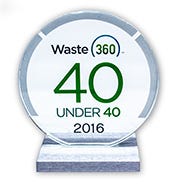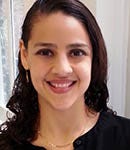Marisa Adler Helped Implement Groundbreaking Initiatives for the DSNY
Waste360 recently spoke with Adler about her career at the DSNY and what she sees for the future of waste and recycling.
Adler was selected for her work as a senior advisor, strategic planning, for the City of New York Department of Sanitation. After her selection, Adler moved on to take a position as a senior consultant with Resource Recycling Systems.
For nearly eight years, Marisa Adler implemented waste prevention, reuse and recycling initiatives for the City of New York Department of Sanitation’s (DSNY) Bureau of Recycling and Sustainability, with a focus on organic waste, hazardous waste and end-of-life product management.
In her role as senior advisor of strategic planning, she worked on high-level strategy projects and she helped make waste and recycling prevention programs more convenient and more accessible for both residents and city agencies.
Waste360 presented Adler with a Waste360 40 Under 40 award earlier this year and recently spoke with her about her career at the DSNY, the goals that the DSNY is working toward this year and what she sees for the future of waste and recycling.
 Waste360: Growing up, did you know that you wanted a career in the waste and recycling industry?
Waste360: Growing up, did you know that you wanted a career in the waste and recycling industry?
Marisa Adler: My passion for the industry was fostered at an early age. I have always been environmentally conscious, and I am someone who appreciates and loves nature. I knew I wanted to be able to protect and conserve the natural world, and solid waste management gives me that opportunity. I also grew up going to garage sales and immersing myself in the informal reuse economy.
When I went to college, I studied natural resource management and learned about the direct relationship between human activity, the waste we generate and the impact on our natural systems and resources. I took those studies further in grad school, where I studied natural resource management and conservation with a focus on waste management.
Waste360: Tell us about your previous role as senior advisor of strategic planning for DSNY.
Marisa Adler: I started off as a program manager for the waste prevention unit in 2008, where I developed and promoted programs focusing on waste prevention, reuse and harmful household product waste. In that role, I worked on e-waste legislation, HHW collection programs, product stewardship and reuse efforts. I also developed two city contract—one for convenient home-based electronics recycling and one for universal and electronic waste generated by city agencies. The waste prevention unit basically focused on any materials that aren’t collected at the curb. I later implemented an organics collection program in more than 700 NYC schools and led the Special Waste Unit, which oversaw citywide HHW events, special waste sites and product stewardship initiatives.
Most recently, as senior advisor of strategic planning, I worked on zero waste strategy, circular economy efforts and other special projects with the goal of reducing waste and increasing access to recycling for residents, institutions and city agencies. All in all, I was lucky to work on a range of very exciting projects for a city of more than 8 million people. It was very exciting.
Waste360: What goals is the DSNY working toward this year?
Marisa Adler: DSNY has ambitious targets for achieving the NYC’s goal of zero waste to landfill by 2030. In order to increase capture and diversion rates to help the city meet its goal, the DSNY is improving and expanding programs to recover organics, textiles and e-waste and keep durable goods out of the landfill. DSNY is continually expanding access to its organics collection program, e-waste program and textile recovery program, and it’s looking at ways to advance product stewardship and extended producer responsibility for problematic materials, such as paint and pharmaceuticals.
Waste360: What do you see for the future of waste and recycling?
 Marisa Adler: Currently, the momentum is around building a circular economy and sustainable materials management, and I think that is something that is beginning to infiltrate business practices on a meaningful scale as companies rethink how they source, manufacture and manage products differently and municipalities rethink the traditional waste management model and their role within it. Ultimately, we all need to work together — cities, companies, brands, consumers, recyclers, processors, manufacturers, suppliers and policymakers —and think about waste products as raw system inputs for the next use instead of garbage.
Marisa Adler: Currently, the momentum is around building a circular economy and sustainable materials management, and I think that is something that is beginning to infiltrate business practices on a meaningful scale as companies rethink how they source, manufacture and manage products differently and municipalities rethink the traditional waste management model and their role within it. Ultimately, we all need to work together — cities, companies, brands, consumers, recyclers, processors, manufacturers, suppliers and policymakers —and think about waste products as raw system inputs for the next use instead of garbage.
Waste360: What advice do you have for the next generation of waste and recycling industry workers?
Maria Adler: First, start learning about the industry and how your municipality manages waste. Visit a local processing facility and talk to your recycling manager. Then, start networking with those in the industry and do online research to find out which aspect of solid waste management you’re interested in because there are plenty of options, such as engineering, public policy, program planning, facility operations, outreach and education, product design, start-ups, government, consulting, etc. Attend industry meetings and local groups focused on your topic area to learn about the industry from practicing professionals. From there, evaluate your personal strengths (everyone is good at something different) and match it to your interests.
Waste360: What does this award mean to you?
Marisa Adler: Garbage can have a stigma to the general public, but those in our industry recognize that there are many ways to bring value back to the things that people don’t traditionally see as having value, and I love that these awards recognize the importance of that and showcase the myriad of people who make it happen. Personally, I was able to bring recognition to the work that DNSY does, and I was able to connect with other recipients to expand my network and learn about best practices across a range of solid waste management topic areas.
About the Author
You May Also Like




